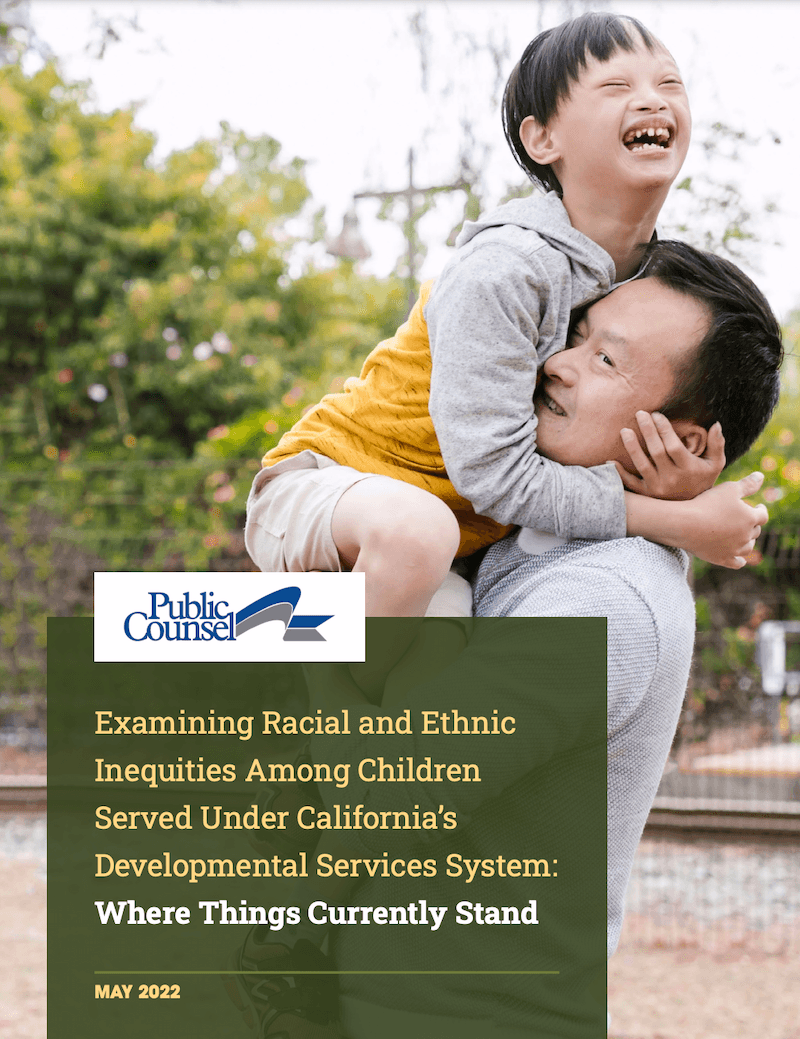Un nuevo informe de Public Counsel muestra que un esfuerzo de seis años y 66 millones de dólares por parte del Estado de California para reducir el acceso desigual a los servicios de desarrollo para los niños ha sido en gran medida ineficaz y que la inequidad "sigue afectando a las comunidades de color." El informe evalúa los resultados de un programa de reducción de disparidades establecido por el estado en 2016 para reducir las desigualdades dentro del sistema de centros regionales de California, una red de agencias financiadas por el estado pero administradas de forma independiente encargadas de proporcionar servicios a los californianos con discapacidades del desarrollo. Las conclusiones del informe incluyen:
- La desigualdad de financiación se agrava entre niños blancos y latinos en la mayoría de los centros regionales.
- Las disparidades en el gasto en servicios entre niños latinos y blancos han mejorado en cuatro centros regionales en los últimos seis años , pero han empeorado en los otros 17 centros regionales.
- Las disparidades para los niños asiáticos han empeorado en todo el estado en los últimos seis años, sin embargo, el estado no tiene objetivos de mejora para esta población.
- Sin explicación alguna, el Departamento de Servicios de Desarrollo (DDS) de California no ha asignado objetivos de mejora para los niños asiáticos en su proceso de supervisión de disparidades y no ha realizado un seguimiento de la trayectoria desigual de este grupo en el marco de este proceso.
- Las disparidades entre los niños de "otro origen étnico" y los niños blancos son las más profundas entre todos los grupos raciales/étnicos y están empeorando.
- Al igual que en el caso de los niños asiáticos, el DDS no ha asignado objetivos de mejora para los niños de "otras etnias" en su proceso de supervisión de la disparidad y no está realizando un seguimiento del empeoramiento de la situación de este grupo en el marco de este proceso.
- Los niños de "otro origen étnico" son el grupo de raza/etnia que crece más rápidamente.
Durante 30 años, los defensores y las familias han expresado su preocupación por las disparidades en el acceso a los servicios. Una exposición del L.A. Times en 2011 reveló marcadas diferencias raciales en los servicios para niños con autismo, lo que llevó al entonces senador estatal Darrell Steinberg a crear un Grupo de Trabajo sobre Equidad y Diversidad que identificó docenas de recomendaciones para la reforma, muchas de las cuales siguen sin aplicarse. El informe de Public Counsel pide una audiencia de supervisión legislativa conjunta para revisar a fondo el empeoramiento de la situación, señalando que "sólo ha habido dos audiencias legislativas dedicadas exclusivamente a examinar las desigualdades de financiación" (en 2012 y 2017), y ninguna de ellas consistió en un conjunto completo de legisladores del Senado y la Asamblea.
El informe formula nueve recomendaciones para resolver los problemas del sistema. Por ejemplo, destaca que el Departamento de Servicios de Desarrollo (DDS) tiene una metodología de financiación defectuosa que perpetúa las desigualdades del sistema: "La fórmula presupuestaria actual del DDS asigna fondos a los centros regionales no en función de las necesidades de sus consumidores, sino de lo que los centros regionales han gastado previamente". La fórmula da lugar a gastos drásticamente diferentes en servicios para niños -a menudo miles de dólares o más al año- incluso entre centros regionales de la misma ciudad.
Una de las soluciones que propone el informe es un plan de gastos específico para cada centro regional que proporcione fondos destinados a grupos desatendidos y subatendidos para acercarlos a la igualdad de financiación con sus homólogos blancos.







